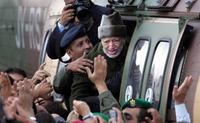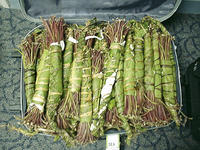-
Prolonged viewing of terrorist incident media coverage tied to acute stress

Stepping away from the television, computer screen or smartphone in the aftermath of terrorist attacks or mass shootings may be beneficial to your mental health. This is the takeaway from a new study showing that six or more daily hours of exposure to media coverage of the Boston Marathon bombings in the week afterward was linked to more acute stress than having been at or near the marathon. Acute stress symptoms increased with each additional hour of bombing-related media exposure via television, social media, videos, print, or radio.
-
-
Is the time finally right for a pan-African security force?
Representatives of fifty-three African states, meeting at an African summit in Paris last week, emphasized the need for a pan-African military force. Observers note that this is not a new idea – it was first raised Ghana’s first president Kwame Nkrumah in 1963 — but that on those few occasions when efforts were made to translate the idea into reality, it has never worked. Notwithstanding the many failures of the past, and the many warning signs of the present, many African leaders and observers are optimistic that this time, the 50-year old dream of a pan-African military force may well be realized.
-
-
Game theory helps corporate risk manage analyze terrorism risks
The challenges of modeling and analyzing terrorism risk are based on the reality that the adversary is one who can alter where and when to strike and has the capability to counter-attack. Before 9/11, the science of risk modeling and analysis for corporations was primarily based on data accumulated from Mother Nature, a less responsive actor. Risk models have become more precise, but this increased precision notwithstanding, terrorists are likely to act in unexpected ways. To anticipate those unexpected ways, risk managers are relying on game theory, with the assumption that exploring hypothetical situations will prepare risk managers for the unexpected.
-
-
UN approves intervention in Central African Republic as violence rages

The UN Security Council yesterday voted for a resolution, put forward by France, which authorized an African Union-led peacekeeping force to intervene in the Central African Republic to prevent the growing chaos from causing the state to disintegrate. The AU force, with the support of French forces, will protect civilians, restore humanitarian access, and stabilize the country. UN officials have warned that the violence between the Christian majority and Muslim minority now in power could lead to genocide.
-
-
Stolen nuclear material found intact in Mexico
Mexican police yesterday said they have found a truck, a white 2007 Volkswagen cargo vehicle, which was stolen Monday by thieves who apparently were not aware that it was carrying toxic radioactive medical material from a hospital to a disposal site. The cobalt-60 the truck was carrying could be used to build a “dirty bomb.” The IAEA said that more than 100 incidents of thefts and other unauthorized activities involving nuclear and radioactive material are reported to the agency annually.
-
-
Yasser Arafat was not poisoned: French investigators

French scientific and medical experts rule out possibility that Palestinian leader was poisoned by radioactive polonium-210. A Russian medical team examining tissue samples taken from Arafat’s body reached the same conclusion three months ago. The conclusions of a Swiss medical team were more ambiguous. Leaders of the Palestinian Authority began accusing Israel of poisoning Arafat even before he died, as his health was rapidly declining. Israel has consistently denied the accusation, describing it as “unreasonable and unsupported by facts.”
-
-
Hezbollah No. 3 commander gunned down in Beirut

Hassan al-Laqees, regarded as the third or fourth most important leader of Hezbollah, was gunned down outside his home in Beirut last night. The Shi’a group blamed Israel for the assassination and warned that Israel would pay a price for the killing. Al-Laqees, who had served in various capacities in Hezbollah since the 1980s, was regarded by Western intelligence services as a brilliant technology and logistics officer. He was in charge of the organization’s arms development and acquisition, technology, and communication, and was heavily involved in operations. Analysts compare the operational blow to Hezbollah from al-Laqees’s assassination to the setback the organization suffered when Israeli agent killed Imad Mughniyeh, the then-operation chief of Hezbollah, in a daring covert operation in Damascus on 12 February 2008.
-
-
First no-fly list case goes to trial
Rahinah Ibrahim, dean of the architecture and engineering school at the University of Malaysia, took to trial on Monday her claim against the U.S. government for wrongfully listing her on the government’s no-fly list. Ibrahim has sought to clear her name since January 2005, when she was arrested at San Francisco International Airport. Similar lawsuits are pending across the country, but Ibrahim’s case is the first to go to trial. Ibrahim claims she was mistakenly placed on the no-fly list due to her national origin and Muslim faith.
-
-
Existing airports through futuristic glass pods
Two small Northeast airports, Syracuse and Atlantic City, have installed futuristic unmanned portals to replace security officers at the airports’ exit points. The move, which will add a few seconds to the end of passengers’ trips as they exit the airports, is estimated to save airports millions of dollars in wages over time.
-
-
Questions over Texas police linking chewable African plant to terrorism

Khat is a chewable African plant containing two active chemical substances — cathinone and cathine – which have a narcotic effect. Chewing the plant is common among men in the Horn of Africa and Yemen. The chemicals are banned in the United States, although the plant itself is not. Texas law-enforcement arrested several Muslim immigrants after a lengthy investigation found they were growing and selling khat. The police portrayed those arrested as supporters of terrorism, and suggested that the profits from the sale of khat to Muslims in the Houston area was sent abroad to support terrorist groups such as al-Shabaab. Civil rights advocates say that in this case, over-eager police and prosecution have confused traditional practice with support for terrorism.
-
-
France reasserting its role as Africa's indispensable power
In March this year, rebel militias, many composed of Muslim fighters from Chad and Sudan, overthrew the government, a move which has resulted in spreading lawlessness among rival warlords, with the risk of the disintegration of the country and sectarian war spilling beyond the country’s borders distinct possibilities. As was the case in Mali earlier this year, France has decided to put its foot down, sending hundreds of troops to the capital Bangui to restore order and restrain the lawless rebels. “The challenge of this intervention [in the Central African Republic],” on analyst wrote, “lies in the ‘return’ of France to the dark continent after decades of interference followed by a period of relative indifference or misstatements. If France succeeds in its Central African mission, it will have recovered a good part of its influence, positioning itself as an indispensable partner in those places where it risked becoming a vague memory.”
-
-
Nigerian vigilantes join fight against Islamist Boko Haram

In Maiduguri, the capital of Borno State in northeastern Nigeria where the Islamist Boko Haram has emerged, a network of vigilantes, called the Civilian JTF, is fighting the militants to gain back control of the local economy and daily life. Many Nigerians are not persuaded the Nigerian military is doing all it could to defeat the Islamist insurgency.
-
-
Security Council condemns LRA’s “war crimes”
The UN Security Council has strongly condemned the war crimes and crimes against humanity perpetrated by the Lord’s Resistance Army (LRA) and its use of children in armed conflict. The council demanded that the group immediately end all hostilities, release all abductees, and disarm and demobilize.
-
-
Community ties affect terrorist groups’ targeting of civilians
A new study finds terrorist groups which are embedded into the society around them may choose tactics that compromise the group’s strategic or ideological priorities in order to avoid alienating local communities. The study highlights how community condemnation generates restraint in terrorists’ targeting of civilians, while endorsements may facilitate such attacks.
-
-
Off-shore barges considered for destroying Syria’s chemical weapons
After failing to find a country willing to allow its territory to be used for disposing of Syria’s chemical weapons, the United States is exploring other options. Two options being seriously considered involve the destruction of Syria’s chemical weapons off shore, rather than on land. Both proposals call for removing the chemical weapons from Syria and placing them on a large barge at sea, where they would be dissolved or incinerated.
-
More headlines
The long view
How Male Grievance Fuels Radicalization and Extremist Violence
Social extremism is evolving in reach and form. While traditional racial supremacy ideologies remain, contemporary movements are now often fueled by something more personal and emotionally resonant: male grievance.
